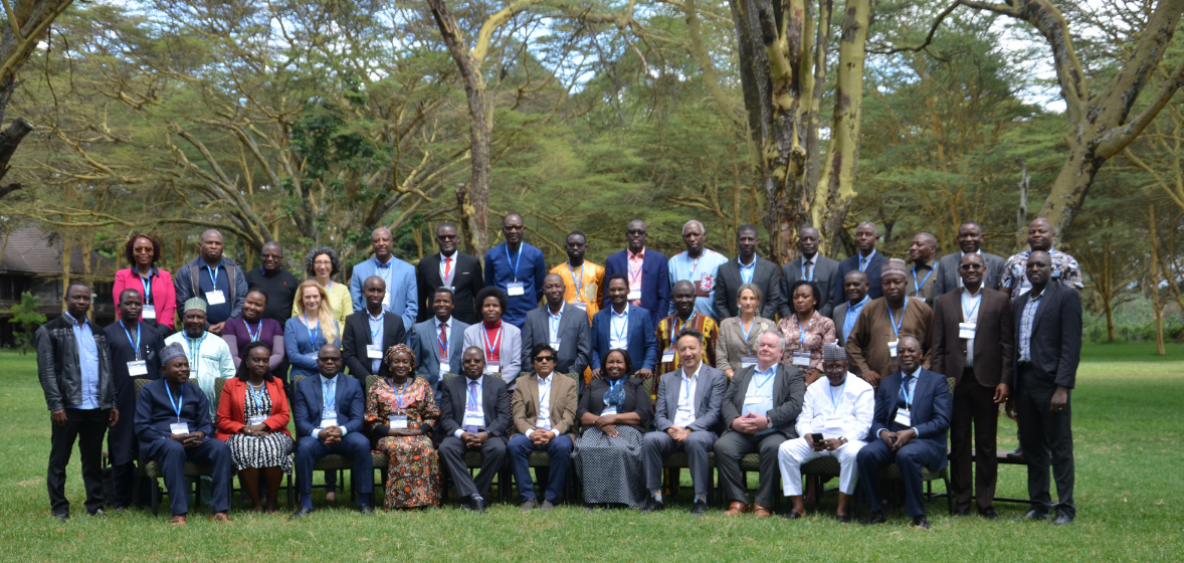 Credit: ICRAF
Credit: ICRAF Following the 2022 RFS Workshop in Malawi, the RFS Programme Coordination Unit (PCU) received overwhelming interest in another Workshop to close out the programme. The PCU took on on this initiative and gathered RFS stakeholders in Naivasha, Kenya for a final exchange of lessons learned, combined with a Science-Policy Learning Day co-hosted with the African Union Commission.
From 6-8 June 2023, RFS partners, stakeholders, government officials, and representatives from the African Union Commission convened for the Final Resilient Food Systems (RFS) Workshop and Science-Policy Learning Day in Naivasha, Kenya.
After receiving overwhelming interest following the 2022 workshop in Malawi which was originally intended to be the final gathering, RFS partners set out to get the community together again for another opportunity to capitalize on south-south learning exchanges with our regional team. The three-day visit began with a Science-Policy Learning Day, co-hosted by the UN Environment Programme (UNEP), the Food and Agriculture Organization of the UN (FAO), and the African Union Commission (AUC) on 6 June. Then followed two days of learning from across the RFS programme to feed into a new publication of lessons learned; a follow-up to its predecessor report, the Emerging Lessons from the RFS Programme from 2021. The final report will be released in the coming weeks.
The purpose of this session was to share best practices, methods, tools, and evidence-based solutions that possess the potential to significantly influence policy directives. The sessions covered the interactions between science and policy, how this feeds into agroecological objectives and food security, the interactions of land tenure and climate change on policy, and experiences from RFS country projects.
Delegates were welcomed with a keynote address from Pierre-Justin Kouka, Senior Comprehensive Africa Agriculture Development Programme (CAADP) Advisor on behalf of the Directorate of Agriculture and Rural Development, AUC, and oriented on the need for interaction between science and policy for enhancing resilient food systems by Charles Sebukeera, Regional Science–Policy Coordinator, Africa region, UNEP.
Examples from all 12 RFS country projects highlighted how the unique political, social, and ecological environments influence the needs and national interests concerning policy development.

The objectives of the 2-day RFS Workshop were twofold: 1) present the working version of the RFS final publication on programmatic lessons learned, discuss its key messages, and improve the capture of lessons learned to advance the integrated approach, and 2) take stock of the preliminary findings of the RFS final evaluation, whilst further informing its content.
Day one was action-packed with sessions dedicated to the 8 thematic sections that comprise the final RFS Lessons Learned Report.
These sections were developed in partnership with Hub agencies and country project teams and the Workshop provided an excellent opportunity to discuss the key messages in a co-learning environment to identify areas for expansion in the final presentation and connect synergies between actors.
Jonky Tenou, Task Manager for the RFS Integrated Approach Pilot, International Fund for Agricultural Development (IFAD), also presented the achievements of the RFS programme presented in the 2022 Programme Highlights Report, and delegates received an update on the terminal evaluation of the programme. To learn more, visit the resource links at the end of this article.

The second day of the RFS Workshop consisted of a trip to the field hosted by the RFS Kenya project, the Upper Tana-Nairobi Water Fund (UTNWF). Delegates in two groups visited farmers Peter Kamau and Stephen Macharia in Sasumua Watershed who have benefitted from participating in the UTNWF activities. Both farmers are implementing water conservation techniques on their farms and benefitting from irrigation schemes that have improved their productivity into the dry season.
The groups also visited the Sasumua Dam Coordinator. Sasumua Reservoir is owned and managed by the Nairobi City Water and Sewerage Company (NCWSC) who serve on the board of management and the board of trustees for the UTNWF.


Upon returning from the field on day 2 of the RFS Workshop, delegates attended a final session to discuss the RFS legacy and way forward.
RFS is one of three integrated approach pilots from the Global Environment Facility’s sixth funding cycle (GEF-6), and the learnings have already been capitalised on to inform the implementation of GEF 7 projects and the design of projects under the GEF 8 cycle. Presentations from GEF-7 Impact Programmes in Eswatini and Kenya showed how the GEF investments contributed to achieving global environmental benefits. Presentations by agencies (FAO, CIFOR-ICRAF, IFAD and UNDP) brought to light how the achievements and lessons learned from RFS had fed into the next GEF programme, especially in the countries where there was programme overlap, underscoring the importance of continuity of action, and how the impact of RFS is much more than a 5-year project.
This may have been the final workshop of the RFS programme, but it’s clearly not the final time RFS stakeholders will meet as we continue forward in enhancing food systems resilience.
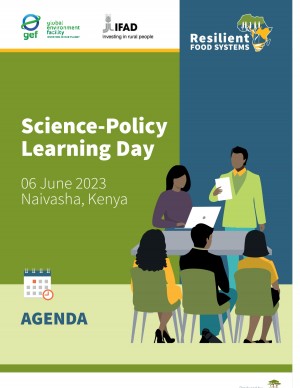
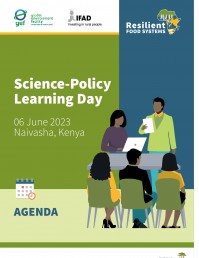
Resilient Food Systems (RFS) country project representatives, partners and Consultative Committee members are invited along with other practitioners to the RFS Final Workshop, to be combined with a Science-Policy Knowledge Exchange Day capitalizing on RFS learnings for improved policy advocacy in Africa.
This document outlines the agenda for 6-8 June 2023, comprising the Science-Policy Day, the Workshop, and the field trip hosted by the Upper Tana-Nairobi Water Fund.
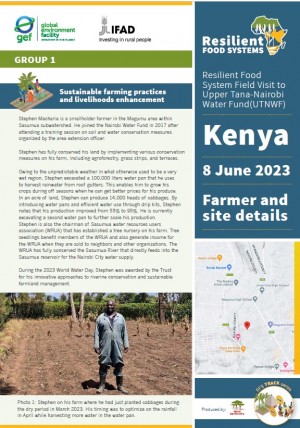
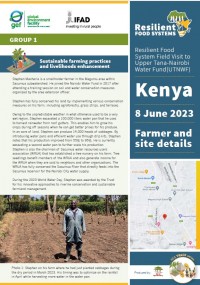
On 8 June 2023, participants of the Resilient Food Systems Programme Final Workshop visited field sites hosted by the Upper Tana-Nairobi Water Fund (RFS Kenya). This briefing note provides background on the farmers and sites visited.
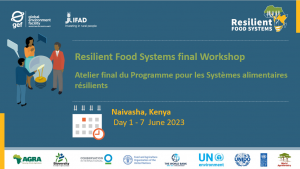
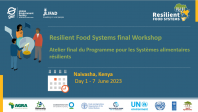
The Resilient Food Systems programme Final Workshop and Science-Policy Learning Day took place in Naivasha, Kenya from 6-8 June 2023. This slide deck comprises the presentations from Day 1 of the Workshop on 7 June under the following programme:
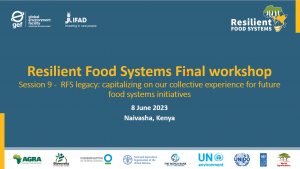
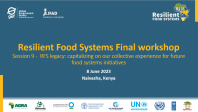
The Resilient Food Systems programme Final Workshop and Science-Policy Learning Day took place in Naivasha, Kenya from 6-8 June 2023. This slide deck comprises the presentations from Day 2 of the Workshop on 8 June concerning Session 9: RFS legacy: capitalizing on our collective experience for future food systems initiatives.
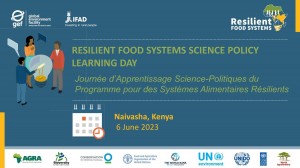
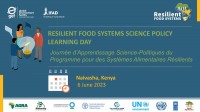
The Resilient Food Systems programme final workshop was preceeded by a Science-Policy Learning Day co-hosted by UNEP, FAO, and the African Union Commission (AUC). This slide deck comprises presentations from across the five sessions of the day:
Subscribe to our monthly newsletter to receive updates on stories directly from the field across all our projects, upcoming events, new resources, and more.